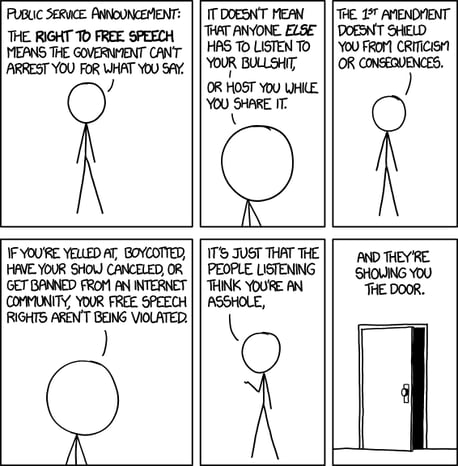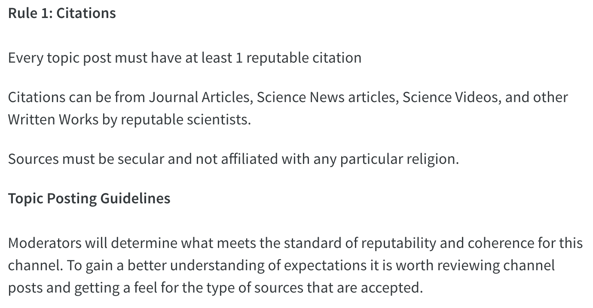If you’re a community leader on the Internet, chances are you've been accused of censoring those whose comments you've deleted. Of course, you probably don't want to come across to your site visitors as an authoritarian dictator-type, and you probably don't refer to yourself as "Big Brother" in your About Me page. But after enough accusations, you might start to wonder… “have I gone too far as a community moderator?”
The diversity of opinions that live on the Internet are infinite (by my precise calculations) so it can be a bit overwhelming when you sit down to decide, "how should people interact with each other on my site?” We're here to help and share a pro-tip that might sound a little counter-intuitive: the more restrictive you are and the clearer you make your rules, the better you can foster high quality engagement.

No shoes, no shirt, no service
So how does this work? The Internet is a big place, and there are many places and ways for people to interact. Your job as a community leader is not to appeal to everyone, but instead, appeal to an intimate community that follows norms and guidelines that are created in cooperation with your members...much like a real life community.
It can help to think of your audience as a unique subset of people within a larger city, and your site, a neighborhood cafe where this community can assemble. Laying down some "house rules" and enforcing them effectively will make your core community members feel safe and welcome every time they step across your digital threshold. Imagine a group of friends who like to discuss comic books at your cafe. What are you doing to ensure they feel safe and happy? It’s reasonable to assume that this group should not have to tolerate some jerk behind the communal couch throwing bagels at their heads. You would likely kick that bagel-flinging assailant to the curb as quickly as possible. Simple as that.
Just like in real life, there are behavioral rules for public spaces like a cafe.
Removing hateful comments or banning users who are there to antagonize others isn’t censorship.
These actions are the consequences for those who do not want to adhere to the unique norms of your fine establishment. Enforcing the rules makes it easier for you to build a safe environment where ideas and engagement can thrive.
The formula is pretty simple:
- Propose a set a of rules;
- Gather feedback and iterate by incorporating your community’s values;
- Communicate the rules clearly and often;
- Lead by example by enforcing the rules. Your community will follow.
It’s important to note that steps 2-4 can be repeated as often as you need. As your community evolves and your audience changes, you’ll likely want to revisit these steps. The more participation your community has in crafting the experience on your site, the better.
Case in point
Take a look at these rules from one of the most active Science communities on Disqus:

Science Channel Guidelines and Rules on sci.disq.us
The first clearly explains one rule for interacting in the community, and the second explains what will happen for ignoring the rules. Choosing to participate in this community means that you have implicitly agreed to these rules. If one doesn’t agree with the rules, they can either provide their feedback or start their own community with different rules.
If you want to learn more on the art of creating community guidelines for your site, see our in-depth guide 4 best practices for integrating community guidelines in your site.
Don’t be afraid to curate
After setting clear guidelines and communicating them to your community, your ability to grow a thriving, healthy community will become much easier. When you delete a comment that doesn’t fit your guidelines, the person on the other end of this action will be more likely to understand your reasoning. Ultimately, you want to make it easier for toxic users to make this key decision:
“Do I rise to the occasion and meet the quality threshold of this community, or do I move on to another community that’s more likely to tolerate my shenanigans?”
We want to hear from community leaders like you:
- How do you get your community involved in defining guidelines and rules?
- What tips and tricks do you have for other community managers for building a unique sense of identity and behavior in your community?

